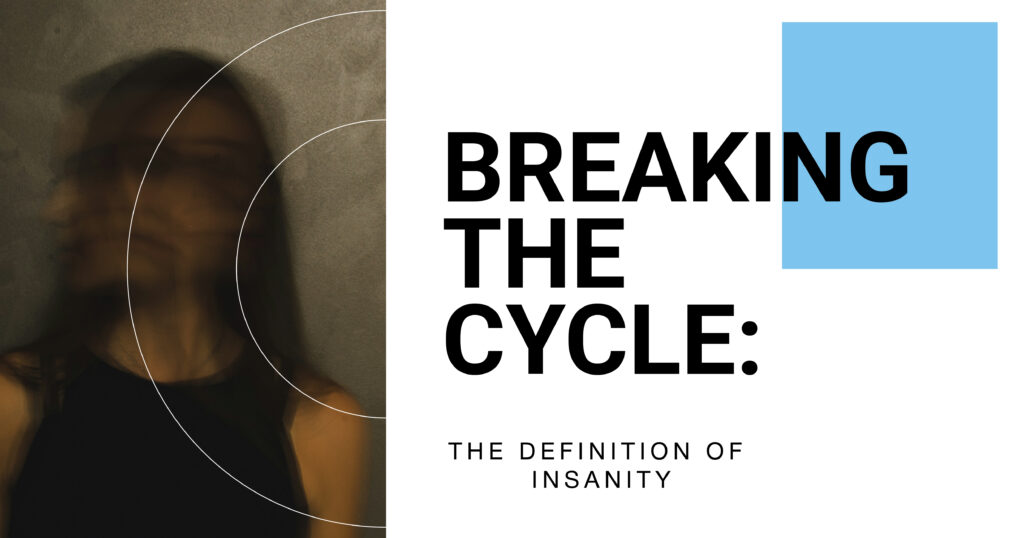Understanding the Definition of Insanity
The “definition of insanity” term has been credited to doing the same thing over and over again and then expecting a different outcome. Though it’s been said in motivational circles or at times of pause, it carries more than just a witty statement. This sentence reminds us of the absurdity of behavior patterns that generate no progress but are continued somehow. In life, there are numerous people caught in the loop of habitual behavior, hoping for something different, but constantly getting the same frustrating results. This kind of repetition, with an unshakeable hope of a different result, is what the majority deems madness.
These patterns are not individualized. In larger systems – like workplaces, governments, or families – people still go and do policy or behavior that produces the same outcome, hoping for a different outcome just around the corner. The hope is still present, but the outcome is the same and the behavior is still done again. This illustrates how deeply rooted irrational tendencies can be embedded in people and groups.
Origins of the Phrase
While Albert Einstein is largely credited with the phrase by many, it’s unclear that he ever uttered it. Its first appearances are found in literature and Narcotics Anonymous writings of the 1980s. Wherever its origins, its meaning rings true. It reminds us that change is impossible without changing our behavior. The same negative result can be achieved by repeating the action without assessment, perpetuating the irrational thought that things will improve by happenstance.
The popularity of this quote is based on its universality. It is reflective of the frustration that many people experience being stuck in a cycle of unproductive behavior.
It is a call to stop the madness – a call for stopping the insanity and deliberate action towards constructive change.

Psychological Perspective on Repetitive Behavior
Psychologists have even researched repetitive behavior, more so repetitive behavior that doesn’t provide positive outcomes. The brain is hardwired to crave familiarity in routines – deleterious as well – since familiarity breeds safety over the unknown. This repetition with adverse outcomes is usually linked to fear, trauma, or ignorance. The feeling that somehow and someway things will improve without a behavior change can create frustration, disillusionment, and emotional burnout.
Clinically, therefore, to continue in the same behavior expecting a different result is associated with cognitive distortions or learned helplessness. They are mind states that refer to irrationality in our thoughts, whereby the future is predetermined by the past when it comes to behavior, despite the occurrence of failure constantly.
People who suffer from anxiety disorders may, for instance, keep refraining from situations in the hope that this time they will feel better. The original anxiety remains, however. Similarly, people suffering from depression may keep retreating, hoping that the quiet will offer them tranquility, although the outcome normally is the opposite. These are founded on irrational hopes and are backed by long-standing habits.
Impact on Mental Health and Daily Life
Rituals and nonsensical behaviors have the potential to affect one’s mental well-being considerably. Habits such as keeping abusive relationships, unproductive time spent, or discrediting career aspirations tend to produce hopelessness and low self-esteem cycles. These habits, unless disturbed, result in depression, anxiety, and hopelessness. Recognition of the cycle is the initial step in the process of restoring balance to one’s mentality.
The ongoing hope for a different result following a similar action erodes self-esteem and perpetuates the loop of emotional dysregulation. Over time, this may lead to more profound psychological disturbance. The individual will begin to question their abilities or construct a reality colored by failure and irrational thinking.
The pressure of such cycles isn’t purely psychological – it’s physiological. Too much of the stress hormones can lead to depletion, lack of sleep, and even illness. That is why ending these cycles is not merely a matter of mental health – it’s a body-wellness issue.
Breaking the Cycle of Repetition
Possessing a recognition of a toxic pattern is only half the battle. To leave, individuals must take conscious action to change their attitudes and behavior. Witnessing that you have the ability to opt for another path is extremely empowering.

Practical Steps
- Awareness – Identify patterns that are not serving your well-being. Journaling or therapy can bring unconscious patterns to awareness.
- Reflection – Identify the underlying cause. Ask yourself: Why do I keep doing this? What fear, trauma, or belief is it stemming from?
- Professional Help – Therapists and counselors can assist in techniques and methods to re-interpret irrational thinking.
- Set Clear Goals – Identify how change is like. Be realistic and specific. Incremental small step-by-step incremental steps are needed.
- Replace Habits – Replace unhealthy patterns with good habits conducive to growth.
- Accountability – Share your goals with someone who can support your progress. Group therapy or peer support can be highly effective.
- Track Progress – Measure your success with small milestones to stay motivated.
- Change Environment – Sometimes changing your surroundings can disrupt the repetitive cycle and spark new, healthier behaviors.
- Challenge Your Expectations – Ask yourself on a regular basis: Is my expectation based on reality or hope without effort?
Freedom from abusive repetition is achieved only through effort. The process might start with the acknowledgment of insanity in repetition, but it ends in selecting better futures through deliberate change.
Real-Life Examples and Insights
Consider the individual constantly selecting the same type of partner with endless heartache. They may say to themselves, “This time will be different,” despite the red flags still waving. Or someone who continually procrastinates on the job, vowing to do better “next time,” but never changing their strategy. All these habitual patterns trace their origins back to deeper patterns, such as fear of change or low self-esteem. Breaking these habits requires excavation and effort, and doing so consciously.
Another example is the businessman using the same marketing strategy unaltered despite repeated failure. They will expect success without altering their action or seeking new advisors, a clear sign of irrationality in real-world application. Such outcomes are not just egocentric – they affect careers, relationships, and self-concept.
Even in the process of recovery from addiction, the saying holds. People don’t relapse because they don’t want to change, but because they continue to use old patterns of failed behavior. There is only one way, and that is through adopting new behaviors, habits, and thoughts; otherwise, the outcome will be the same.
Pathways to Mental Wellness
Mental wellness is not perfection – it’s improvement. True healing is derived from small, incremental changes. Practice careful thinking, visit a therapist, establish a support network, and relish each victory. Consistency will never cease, but every step moves us forward.
Learning how to control irrational behaviors and changing the way we respond to stressors can lead to profound emotional balance.
Mental health is about bringing one to an awareness of behavioral mechanisms and outcomes, making one aware of the role of repetition and expectation in perpetuating or surviving madness. When individuals intentionally alter their behaviors and remove illogical thoughts, they open the doors to lucidity, balance, and self-improvement.
Support systems are the most important thing here. Family and friends, and also professionals, can assist you in perceiving when you are trapped in loops and may keep you on course for change. The most crucial weapons to shatter the loops of irrationality are therapy, support groups, and wellness programs.
Achieve Stability With Clear Mind Treatment
At Clear Mind Treatment, we understand that sometimes it is hard to break away from irrational patterns and ongoing disappointment. Our compassionate staff provides personalized mental health care to assist you in viewing, comprehending, and ending the patterns hindering you from living your highest potential. We assist individuals in achieving the clarity and confidence necessary to develop a brighter future through the assistance of therapy, support groups, and evidence-based interventions.
We help you discover patterns of behavior, restate your expectations, and guide you towards behaviors that bring about new and better results. If you’re getting stuck in irrational thinking patterns or willing to enhance your mental attitude, our team is here to support your journey towards meaningful change.
If you or a loved one is trapped in a frustrating cycle of habitual actions and unmet expectations, today’s the day to escape. Contact Clear Mind Treatment for empathetic support and professional help that is on your path to mental health. Don’t wait – your fresh start starts today.
FAQs
What does the “definition of insanity” refer to in terms of repeated actions?
It is the concept that doing the same things but hoping for different results is illogical. This line of thinking can keep people stuck in patterns of useless or even destructive behavior.
In what way is repetitive action with the same expectations related to insanity?
It is the expression of an unrealistic hope that something is going to be different without any real change. This can lead to frustration and poor mental health over time.
Why ought it be considered irrational to anticipate different results from the same conduct?
Because without a change in technique or technique, the outcomes are likely to be much the same. Rationality involves adapting based on what one has already gone through.
Should awaiting another result from an identical act be labeled madness?
Yes, figuratively. Vainly praying for change yet doing nothing will usually show unreality, or madness to some.
How much of a role does irrationality have in waiting for different outcomes from repeated acts?
Irrationality clouds the mind and causes people to retain hope but fail to make adjustments. This variance hinders development and mental sanity.








